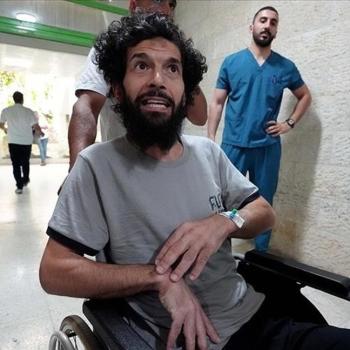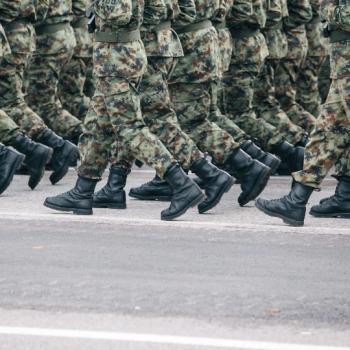Remember how Jesus used to single out individuals, especially marginalized individuals, for special blessing?
Remember the Samaritan woman, the bleeding woman, the Canaanite woman, the tax collector? Remember “let the little children come to me”? Remember how the heroes in his parables were a Samaritan (Luke 10:25-37), a poor beggar covered with sores (Luke 16:19-31), a debtor (Luke 7:40-43), and a tax collector (Luke 18:9–14)?
Here are four short, true stories about marginalized people that tell big truths. Stories first, then we’ll talk about the truths.
PETRUSO
Petruso was a 24-year-old Ukrainian man with Down Syndrome. He and his family lived in the city of Mariupol. Petruso’s Down Syndrome was a severe case. He was heavy and had trouble walking. He could feed himself simple foods, but wore diapers that his mother changed for him.
When Mariupol came under attack by Russian troops on March 4th, the sounds of bombing terrified Petruso. Most of the neighborhood evacuated before the troops arrived, but Petruso and his family hunkered down. They knew how hard it would be to flee with Petruso, who hated to be in unfamiliar surroundings.
Russian soldiers with combat dogs went from house to house, expelling anyone they found. When they came to Petruso’s home, they ordered the family outside at gunpoint, but Petruso was paralyzed with fear, and stayed where he was on the couch. They sent in one of the dogs, which tore into his arm, then his chest.
The family was forced to leave the neighborhood without him, and asked the Red Cross to rescue him. But the Russian forces would not cooperate.
When they military finally withdrew from the neighborhood a week later, the family went back, fearful that Petruso had been taken away as a prisoner. Instead, they found him right where they’d left him, badly mauled, dead, and decomposing.
JAIME
Jaime was a 13-year-old Cuban-American boy living in Winter Haven, FL. On July 11th, while standing on a street corner with a group of boys, he allegedly kicked a soda can at a police vehicle while it sat at a stop sign. The can bounced unexpectedly and hit the passenger side front door. The officer later claimed the sound led him to believe Jaime had shot at the car, and he believed he was in danger.
The officer opened fire at Jaime through the window, hitting him in the abdomen, hand, leg, and pelvis. The driver then stepped out of the car and shot the boy as he lay injured on the ground, hitting him in the chest.
Jaime died twelve days later.
TYRELL
Tyrell is a thirty-seven-year-old African American man, living in St. Louis with a wife and six children. He worked as a butcher, but his passion was bodybuilding. Before the police raided his home last fall and hauled him off to prison, Tyrell weighed in at 240 pounds, all muscle.
To this day, he doesn’t know why he was arrested – in fact, he was never charged with a crime during his nine months behind bars.
Tyrell was released recently, weighing less than 120 pounds and barely able to walk. From his hospital bed, he told reporters he had been beaten severely, many times, tortured, and (obviously) starved. The prison conditions he described were horrific – crowded, filthy, and cruel.
When asked about Tyrell’s accusation, the St. Louis Correctional Facility released a statement: “All prisoners are detained according to the law. All basic rights required are fully applied by professionally trained prison guards…The prisoner was examined and treated medically by the facility’s finest doctors throughout his incarceration” – adding that he could file a complaint if he wished.
AUSTIN
Austin was thirteen when he got swept up in the Kentucky justice system. Back in 2015, he was hanging out with his fifteen-year-old cousin Roy, who decided he wanted to make some trouble. Roy led the way as they entered a rough neighborhood, and Roy attempted to stab someone on a crowded street. Roy was shot dead by a police officer, and someone from the crowd, assuming Austin was involved in the attack, ran him over with their car. He suffered internal injuries and skull fractures.
He was arrested and brutally interrogated – on video tape – without a lawyer or family member present.
He was tried as an adult at the age of fourteen, and although he was found not to have participated in the stabbing, he was convicted of attempted murder and sentenced to twelve years in prison (the sentence was later reduced to 9 1/2 years).
Since entering the prison system, Austin has experienced tremendous abuse, and – probably related to the head injury and/or his brutal treatment – has been diagnosed with schizophrenia, psychosis, severe depression, and suicidal thoughts. He has spent long periods in solitary confinement, which has negatively impacted his already precarious mental health.
In prison, Austin has not received proper medical care or medications he needs. Most of all, he continues to be in an environment that is making his condition worse.
Austin’s family hope and pray that he will survive his sentence. What his life will be like post prison remains to be seen.
Now for the truths behind the stories:
Petruso, the man with Down Syndrome, is really Muhammed. He lived in Gaza City. All of the details in Petruso’s story are true of Muhammed.
Israel has admitted that, although the group of soldiers included a doctor, Muhammed was not treated after being mauled, but abandoned to die alone. Read his story here.
(If you feel less sympathy for Muhammed than for Petruso, ask yourself why.)
In the ten months since the war on Gaza began (and for years before that), the Israeli military has been committing war crimes and subjecting Palestinians to daily serious human rights abuses. A few of many examples are here, here, here, and here (not to mention genocide).

















